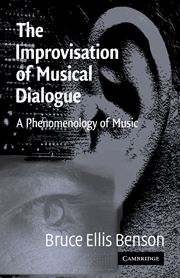FOUR - The Ergon within Energeia
Published online by Cambridge University Press: 14 January 2010
Summary
Regarded in its true nature, language is an enduring thing, and at every moment a transitory one. Even its maintenance by writing is always just an incomplete, mummy-like preservation, only needed again in attempting to picture the living utterance. In itself it is no product (Ergon), but an activity (Energeia). Its true definition therefore can only be a genetic one.
So what results from the improvisatory movement of composition and performance? From musical energeia grows an ergon – but an ergon that still remains within the play of musical energeia, and from which it cannot be disconnected. Indeed, we might more properly say that this ergon exists as energeia. Thus, improvisation provides a way of conceptualizing music that does not force us to choose between defining music as either ergon or energeia. Music that is improvised endures and is yet transitory. Being transitory, its existence is very much genetic, historical, changing; but, in that it likewise endures, it has a continuing identity.
To see music as essentially improvisational clearly has certain implications for musical activity. First, while we need not necessarily see the creation of musical works as incompatible with the activity of music making – indeed, they can be seen as interdependent – the telos of music making cannot be defined simply in terms of the creation of musical works, or even primarily so. Instead, the work becomes a means to the end of making music, not an end in itself.
- Type
- Chapter
- Information
- The Improvisation of Musical DialogueA Phenomenology of Music, pp. 125 - 162Publisher: Cambridge University PressPrint publication year: 2003



